The Feminism Portal
.svg.png.webp)
.JPG.webp)
Feminism is a range of socio-political movements and ideologies that aim to define and establish the political, economic, personal, and social equality of the sexes. Feminism holds the position that societies prioritize the male point of view and that women are treated unjustly in these societies. Efforts to change this include fighting against gender stereotypes and improving educational, professional, and interpersonal opportunities and outcomes for women.
Originating in late 18th-century Europe, feminist movements have campaigned and continue to campaign for women's rights, including the right to vote, run for public office, work, earn equal pay, own property, receive education, enter into contracts, have equal rights within marriage, and maternity leave. Feminists have also worked to ensure access to contraception, legal abortions, and social integration; and to protect women and girls from sexual assault, sexual harassment, and domestic violence. Changes in female dress standards and acceptable physical activities for females have also been part of feminist movements.
Many scholars consider feminist campaigns to be a main force behind major historical societal changes for women's rights, particularly in the West, where they are near-universally credited with achieving women's suffrage, gender-neutral language, reproductive rights for women (including access to contraceptives and abortion), and the right to enter into contracts and own property. Although feminist advocacy is, and has been, mainly focused on women's rights, some argue for the inclusion of men's liberation within its aims, because they believe that men are also harmed by traditional gender roles. Feminist theory, which emerged from feminist movements, aims to understand the nature of gender inequality by examining women's social roles and lived experiences. Feminist theorists have developed theories in a variety of disciplines in order to respond to issues concerning gender.
Numerous feminist movements and ideologies have developed over the years, representing different viewpoints and political aims. Traditionally, since the 19th century, first-wave liberal feminism, which sought political and legal equality through reforms within a liberal democratic framework, was contrasted with labour-based proletarian women's movements that over time developed into socialist and Marxist feminism based on class struggle theory. Since the 1960s, both of these traditions are also contrasted with the radical feminism that arose from the radical wing of second-wave feminism and that calls for a radical reordering of society to eliminate patriarchy. Liberal, socialist, and radical feminism are sometimes referred to as the "Big Three" schools of feminist thought.
Since the late 20th century, many newer forms of feminism have emerged. Some forms, such as white feminism and gender-critical feminism, have been criticized as taking into account only white, middle class, college-educated, heterosexual, or cisgender perspectives. These criticisms have led to the creation of ethnically specific or multicultural forms of feminism, such as black feminism and intersectional feminism. Some have argued that feminism often promotes misandry and the elevation of women's interests above men's, and criticize radical feminist positions as harmful to both men and women. (Full article...)
Featured article

Featured picture
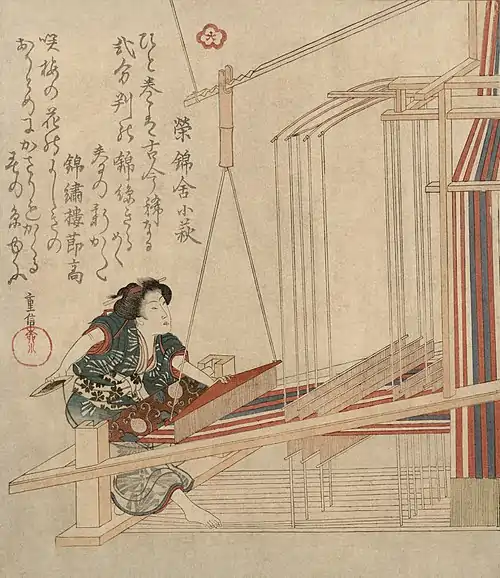
A Japanese weaver using a beater that is mounted from a notched pole and suspended overhead. Woodcut print by Yanagawa Shigenobu, 1825-1832.
In this month
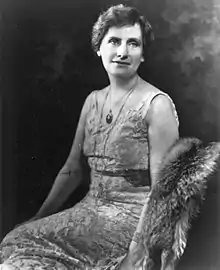
- January 1920 – Shin Fujin Kyokai (The New Woman Association) drafts its demands to the Japanese government, insisting that the law allow women to participate in politics and that divorce be equitable
- January 1972 – First publication of Ms. (magazine) magazine, founded by Gloria Steinem and Letty Cottin Pogrebin
- 5 January 1925 – Sworn in as governor of Wyoming, Nellie Taylor Ross (pictured) became the first woman to serve as governor of a U.S. state
- 22 January 1973 – Roe v. Wade decided by the United States Supreme Court, legalizing abortion
- 23 January 1823 – Birth of Camilla Collett, considered Norway's first feminist; her only novel deals with the difficulties of being a woman in a patriarchal society
Selected quote
Related portals
Featured biography
Bette Davis was a two-time Academy Award-winning American actress of film, television and theatre. Noted for her willingness to play unsympathetic characters, she was highly regarded for her performances in a range of film genres, from contemporary crime melodramas to historical and period films and occasional comedies, though her greatest successes were romantic dramas. Until the late 1940s, she was one of American cinema's most celebrated leading actresses, known for her forceful and intense style. Her forthright manner, clipped vocal style and ubiquitous cigarette contributed to a public persona which has often been imitated and satirized. Davis was the co-founder of the Hollywood Canteen, and was the first female president of the Academy of Motion Picture Arts and Sciences. Her career went through several periods of decline, and she admitted that her success had often been at the expense of her personal relationships. Married four times, she was once widowed and thrice divorced, and raised her children as a single parent. Her final years were marred by a long period of ill health, however she continued acting until shortly before her death from breast cancer, with more than a hundred film, television and theater roles to her credit. In 1999, Davis was placed second, behind Katharine Hepburn, on the American Film Institute's list of the greatest female stars of all time.
Did you know (auto-generated) -
- ... that Chava Shapiro published the first feminist manifesto in Hebrew, lamenting the absence of women's voices in the language's literature?
- ... that attending the first Women in Print Conference inspired Carol Seajay to create Feminist Bookstore News?
More did you know
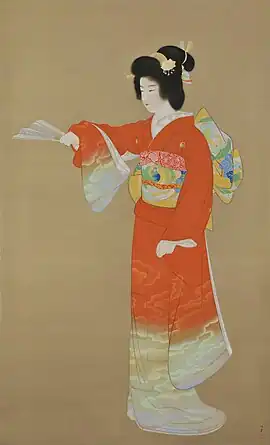
- ...that Japanese painter Uemura Shoen (work pictured) was the first woman awarded Japan's prestigious Order of Culture?
- ...that Clare Winger Harris was the first woman to publish short stories under her own name in science fiction magazines?
- ...that Lois DeBerry is the first African-American woman speaker pro tempore of the Tennessee House of Representatives?
General images -
WikiProjects
![]()
- WikiProject Feminism
- WikiProject Gender Studies
- WikiProject LGBT
- WikiProject Human Rights
- WikiProject Sociology
- WikiProject Philosophy
- WikiProject Discrimination
- Wikipedia:WikiProject Women's sport
Topics
Categories
Featured content

| This is a list of recognized content, updated weekly by JL-Bot (talk · contribs) (typically on Saturdays). There is no need to edit the list yourself. If an article is missing from the list, make sure it is tagged (e.g. {{WikiProject Feminism}}) or categorized correctly and wait for the next update. See WP:RECOG for configuration options. |
Featured articles
 Vidya Balan
Vidya Balan Louise Bryant
Louise Bryant Josephine Butler
Josephine Butler Control (Janet Jackson album)
Control (Janet Jackson album) Marjory Stoneman Douglas
Marjory Stoneman Douglas Female genital mutilation
Female genital mutilation Margaret Fuller
Margaret Fuller Emma Goldman
Emma Goldman Inter-Allied Women's Conference
Inter-Allied Women's Conference Janet Jackson
Janet Jackson Kahaani
Kahaani Olive Morris
Olive Morris Mothers of the Disappeared
Mothers of the Disappeared Jessie Murray
Jessie Murray Margaret Murray
Margaret Murray Florence Nagle
Florence Nagle Emmeline Pankhurst
Emmeline Pankhurst Katy Perry
Katy Perry Adelaide Anne Procter
Adelaide Anne Procter Susan B. Anthony dollar
Susan B. Anthony dollar Taylor Swift
Taylor Swift Harriet Tubman
Harriet Tubman A Vindication of the Rights of Woman
A Vindication of the Rights of Woman Emma Watson
Emma Watson We Can Do It!
We Can Do It! Wife selling (English custom)
Wife selling (English custom) Mary Wollstonecraft
Mary Wollstonecraft École Polytechnique massacre
École Polytechnique massacre
Featured lists
Good articles
 Nineteenth Amendment to the United States Constitution
Nineteenth Amendment to the United States Constitution Ángela Acuña Braun
Ángela Acuña Braun Susan B. Anthony II
Susan B. Anthony II Elena Arizmendi Mejía
Elena Arizmendi Mejía Trinidad Arroyo
Trinidad Arroyo Aurora (Sleeping Beauty)
Aurora (Sleeping Beauty) Ay mamá
Ay mamá Rachel Barrett
Rachel Barrett Gerlin Bean
Gerlin Bean Belle (Beauty and the Beast)
Belle (Beauty and the Beast) Beyoncé
Beyoncé Birth control
Birth control Jeni Bojilova-Pateva
Jeni Bojilova-Pateva Virginia Bolten
Virginia Bolten Build a Bitch
Build a Bitch Can't Hold Us Down
Can't Hold Us Down Claudia Cardinale
Claudia Cardinale A Catholic Statement on Pluralism and Abortion
A Catholic Statement on Pluralism and Abortion Cherry Wine (Hozier song)
Cherry Wine (Hozier song) Child prostitution
Child prostitution Lara Croft
Lara Croft Cutting the Mustard
Cutting the Mustard Lucinda Lee Dalton
Lucinda Lee Dalton Emily Davies
Emily Davies Maymie de Mena
Maymie de Mena 2012 Delhi gang rape and murder
2012 Delhi gang rape and murder The Dirty Picture
The Dirty Picture Elisabeth Dmitrieff
Elisabeth Dmitrieff Double burden
Double burden Anne Dallas Dudley
Anne Dallas Dudley Andrea Dworkin
Andrea Dworkin Mary Beth Edelson
Mary Beth Edelson Lilian Faithfull
Lilian Faithfull All-China Women's Federation
All-China Women's Federation Feminism
Feminism Feminism in Russia
Feminism in Russia Feminist Improvising Group
Feminist Improvising Group Feminist economics
Feminist economics María Teresa Ferrari
María Teresa Ferrari Princess Fiona
Princess Fiona Jane Fonda
Jane Fonda Marge Frantz
Marge Frantz Edith Garrud
Edith Garrud Kirsten Gillibrand
Kirsten Gillibrand Glorieta de las mujeres que luchan
Glorieta de las mujeres que luchan Laura de Force Gordon
Laura de Force Gordon Government Hooker
Government Hooker Güzel İstanbul
Güzel İstanbul Aileen Hernandez
Aileen Hernandez Hitachi Magic Wand
Hitachi Magic Wand Hole (band)
Hole (band) Howl's Moving Castle (film)
Howl's Moving Castle (film) Clair Huxtable
Clair Huxtable I'll Make a Man Out of You
I'll Make a Man Out of You Incel
Incel Independent Women's Forum
Independent Women's Forum Jane Collective
Jane Collective Jasmine (Aladdin)
Jasmine (Aladdin) Doris Sands Johnson
Doris Sands Johnson India Juliana
India Juliana Kim Possible
Kim Possible Gina Krog
Gina Krog Lady Like
Lady Like Lady Like (song)
Lady Like (song) Astrid Lindgren
Astrid Lindgren Love, Loss, and What I Wore
Love, Loss, and What I Wore Madonna
Madonna Malouma
Malouma Marie of Romania
Marie of Romania Bertha Mason (suffragist)
Bertha Mason (suffragist) Lise Meitner
Lise Meitner Maria Mies
Maria Mies Kate Millett
Kate Millett Moana (character)
Moana (character) Mother's Little Helper
Mother's Little Helper Mulan (Disney character)
Mulan (Disney character) Nala (The Lion King)
Nala (The Lion King) Louise Nevelson
Louise Nevelson No One Killed Jessica
No One Killed Jessica Paper or Plastic (song)
Paper or Plastic (song) Patricia Paputsakis
Patricia Paputsakis Part of Your World
Part of Your World Planned Parenthood
Planned Parenthood Kim Possible (character)
Kim Possible (character) Pussy Riot
Pussy Riot Funmilayo Ransome-Kuti
Funmilayo Ransome-Kuti A Rape on Campus
A Rape on Campus Megan Rapinoe
Megan Rapinoe Rasan (organization)
Rasan (organization) Marcela Revollo
Marcela Revollo Tessie Reynolds
Tessie Reynolds Nina Salaman
Nina Salaman Zainab Salbi
Zainab Salbi Linda Sarsour
Linda Sarsour Cher Scarlett
Cher Scarlett Rosika Schwimmer
Rosika Schwimmer Seneca Falls Convention
Seneca Falls Convention Shadowland (The Lion King)
Shadowland (The Lion King) Chava Shapiro
Chava Shapiro Manal al-Sharif
Manal al-Sharif Mary Stuart Smith
Mary Stuart Smith Valerie Solanas
Valerie Solanas Miriam Soljak
Miriam Soljak Hope Solo
Hope Solo Elizabeth Cady Stanton
Elizabeth Cady Stanton Shelby Starner
Shelby Starner Gloria Steinem
Gloria Steinem Jessie Stephen
Jessie Stephen Doris Stevens
Doris Stevens Cecilia Suárez
Cecilia Suárez Tailhook scandal
Tailhook scandal Thung Sin Nio
Thung Sin Nio Nino Tkeshelashvili
Nino Tkeshelashvili A Toast to Men
A Toast to Men Maria Trubnikova
Maria Trubnikova Lana Turner
Lana Turner Mary Two-Axe Earley
Mary Two-Axe Earley Ugly (Fantasia song)
Ugly (Fantasia song) WAP (song)
WAP (song) Jean Walton
Jean Walton Abby Wambach
Abby Wambach The Woman's Bible
The Woman's Bible Woman's club movement in the United States
Woman's club movement in the United States Optional Protocol to the Convention on the Elimination of All Forms of Discrimination Against Women
Optional Protocol to the Convention on the Elimination of All Forms of Discrimination Against Women Women in early modern Scotland
Women in early modern Scotland Women in classical Athens
Women in classical Athens Women's March on Portland
Women's March on Portland Women's suffrage in Wales
Women's suffrage in Wales Xue Susu
Xue Susu
Featured pictures
 Alice Manfield - Guide Alice, Mt Buffalo, c1900-30, SLV
Alice Manfield - Guide Alice, Mt Buffalo, c1900-30, SLV Alice Park - Records of the National Woman's Party
Alice Park - Records of the National Woman's Party_by_Harris_%2526_Ewing.jpg.webp) Alice Paul (1915) by Harris & Ewing
Alice Paul (1915) by Harris & Ewing Angela Davis in a half-length portrait by Bernard Gotfryd - crop
Angela Davis in a half-length portrait by Bernard Gotfryd - crop Anne Dallas Dudley LOC
Anne Dallas Dudley LOC Avril de Sainte-Croix - Restored, cropped
Avril de Sainte-Croix - Restored, cropped Bertha Lutz 1925
Bertha Lutz 1925 Cabinet Card of Sojourner Truth - Collection of the National Museum of African American History and Culture
Cabinet Card of Sojourner Truth - Collection of the National Museum of African American History and Culture Convicts Lunatics and Women! Have No Vote for Parliament, ca. 1907-1918
Convicts Lunatics and Women! Have No Vote for Parliament, ca. 1907-1918 Dr. Caroline Spencer 275029v
Dr. Caroline Spencer 275029v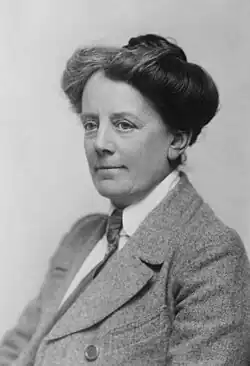 Ethel Smyth
Ethel Smyth%252C_1896.jpg.webp) Frances Benjamin Johnston, Self-Portrait (as "New Woman"), 1896
Frances Benjamin Johnston, Self-Portrait (as "New Woman"), 1896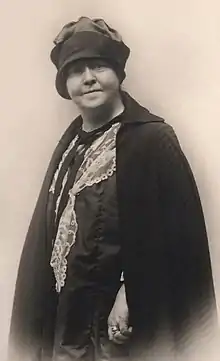 Fredrikke Mørck
Fredrikke Mørck George Charles Beresford - Virginia Woolf in 1902 - Restoration
George Charles Beresford - Virginia Woolf in 1902 - Restoration Henrietta Rodman from the George Grantham Bain Collection
Henrietta Rodman from the George Grantham Bain Collection Henry Mayer, The Awakening, 1915 Cornell CUL PJM 1176 01 - Restoration
Henry Mayer, The Awakening, 1915 Cornell CUL PJM 1176 01 - Restoration Hester Jeffrey
Hester Jeffrey Hubertine Auclert 1910
Hubertine Auclert 1910 Iris Calderhead
Iris Calderhead Joy Young Rogers outside the White House
Joy Young Rogers outside the White House Lucretia Mott, signed photo, by F. Gutekunst
Lucretia Mott, signed photo, by F. Gutekunst Mabel Vernon, c. 1917, by Edmonston, Washington, D.C.
Mabel Vernon, c. 1917, by Edmonston, Washington, D.C. Marguerite Durand 1910 - Restoration
Marguerite Durand 1910 - Restoration Marie Stopes in her laboratory, 1904 - Restoration
Marie Stopes in her laboratory, 1904 - Restoration Mary Garrity - Ida B. Wells-Barnett - Google Art Project - restoration crop
Mary Garrity - Ida B. Wells-Barnett - Google Art Project - restoration crop Millicent Fawcett
Millicent Fawcett Mrs. Crystal Eastman Benedict by Edmonston, Washington, D.C.
Mrs. Crystal Eastman Benedict by Edmonston, Washington, D.C. Mrs. Lillian Ascough, chairman of the Connecticut branch of the Woman's Party
Mrs. Lillian Ascough, chairman of the Connecticut branch of the Woman's Party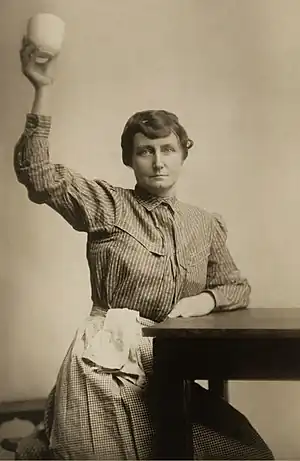 Mrs. Pauline Adams 147002v
Mrs. Pauline Adams 147002v_-_Restoration.jpg.webp) Portrett av Gina Krog (6276081582) - Restoration
Portrett av Gina Krog (6276081582) - Restoration Poster by Anna Soós Korànyi for the Seventh Conference of the International Woman Suffrage Alliance
Poster by Anna Soós Korànyi for the Seventh Conference of the International Woman Suffrage Alliance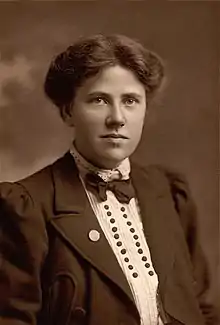 Ray Strachey restored
Ray Strachey restored.jpg.webp) Sojourner Truth, 1870 (cropped, restored)
Sojourner Truth, 1870 (cropped, restored) Victoria Claflin Woodhull by Mathew Brady - Oval Portrait
Victoria Claflin Woodhull by Mathew Brady - Oval Portrait.jpg.webp) Voltairine de Cleyre (Age 35)
Voltairine de Cleyre (Age 35) We Can Do It! NARA 535413 - Restoration 2
We Can Do It! NARA 535413 - Restoration 2
Featured portals
Good topics
 Lady Like
Lady Like
Things you can do

- Add {{Portal|Feminism}} to the See also section of Feminism-related articles.
- Tag the talk pages of Feminism-related articles with {{WikiProject Feminism}}
- Join Wikipedia:WikiProject Feminism
- Cleanup: A cleanup listing for this project is available, updated by CleanupWorklistBot.
- Notability: Articles with notability concerns, listed at WikiProject Notability
- Rate the Unassessed Gender Studies articles in the Gender Studies WikiProject.
- Requested articles: Requested articles on Feminism, Requested articles on Feminist figures
- Stubs: Gender studies stubs, Feminism stubs, Women's rights activist stubs
Wikimedia
The following Wikimedia Foundation sister projects provide more on this subject:
-
 Commons
Commons
Free media repository -
 Wikibooks
Wikibooks
Free textbooks and manuals -
 Wikidata
Wikidata
Free knowledge base -
 Wikinews
Wikinews
Free-content news -
 Wikiquote
Wikiquote
Collection of quotations -
 Wikisource
Wikisource
Free-content library -
 Wikiversity
Wikiversity
Free learning tools -
 Wiktionary
Wiktionary
Dictionary and thesaurus
-
 List of all portals
List of all portals -

-

-

-

-

-

-

-

-

-
 Random portal
Random portal -
 WikiProject Portals
WikiProject Portals





















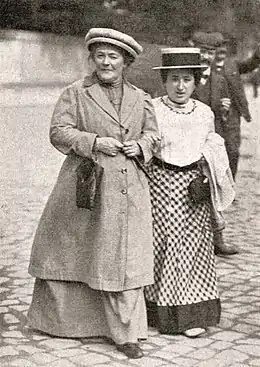
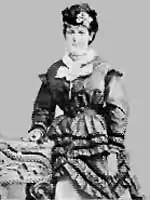
.jpg.webp)






.jpg.webp)




